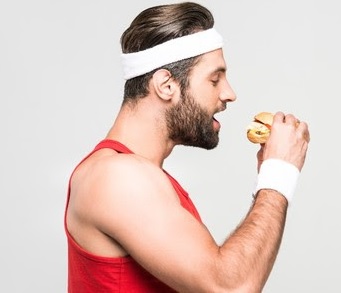|
The Tokyo Olympics is just around the corner. Athletes from around the world have been training intensly for the past four years. Beyond training, another parameter is decisive for their performance: food.
"Combining the right diet with training is critical for success at the Olympic Games. Without enough food, and thereby energy, an athlete's performance will be far from optimal, regardless of how much they've trained," explains Professor Lars Nybo of the University of Copenhagen's Department of Nutrition, Exercise and Sports.
In the long run, the best diet for athletes isn't as simple as pounding protein drinks and chomping chocolate bars. What foods, how much and when they should eat, depends entirely upon their sporting discipline.
"We all need the right amount of protein, carbohydrate, fat, vitamins, minerals, salt and fatty acids for optimal performance. But in some disciplines, it is essential to load up on carbohydrates during the final 48 hours prior to an event, whereas athletes in other disciplines can get away with eating junk food for breakfast," he explains.
Shot-putters can eat whatever they want on event days
For a shot-putter, their diet and training in the years leading up to an Olympic Games matters most for their ability to build the explosive strength needed to push a 7 kg ball as far as possible.
"Generally, a shot-putter consumes a substantial amount of food on a daily basis, and post-workout protein in particular, in the run up to an Olympic Games, so as to build up muscle mass with which to launch their ball. With regards to event-day, what they eat isn't too important. That's because their performance is so brief that they needn't have a vast reserve of energy built up in advance. In a nutshell, a shot-putter can eat junk food or doughnuts for breakfast," explains Nybo.
The same dietary principle applies in other explosive disciplines, such as for 100-meter sprinters, javelin throwers and high jumpers, because energy is only required for relatively short durations. For them, no special diet is needed on the days immediately before or on event days.
"Nevertheless, it is important for these athletes to not overeat prior to competition. Because, as one stores energy from food, water is stored in the body as well. This makes us heavier, which isn't smart when competing," Professor Nybo explains.
Cyclists require an abundance of lighter meals
Whereas shot-putters, sprinters and javelin throwers needn't focus on specific dietary regimens on the days prior to an Olympic performance, things are quite different for distance runners and cyclists who may need to run 42.2 km or ride 244 km. Nybo explains:
"While a road cyclist also needs to have consumed a healthy, varied diet leading up to the Olympics, the final two days before an event are of particular importance. During this time, a rider must consume large quantities of carbohydrate in the form of rice or white bread, for example," he says.
This is because glycogen, the sugar from these foodstuffs, needs to be stored in muscles and the liver. Glycogen delivers riders an extra shot of energy once their muscles are set into motion and the pedals are being spun hard.
"Furthermore, cyclists need to eat lighter, more frequent meals during a long race - chocolate and energy drinks for example. This deposit of sugar is saved and provides energy throughout races," concludes Lars Nybo.
The Olympic Games will commence on 23 July and finish on 8 July 2021.
FACTS
The amount of carbohydrate used by a cyclist
-
A 70 kg Dane will typically eat about 3-4 grams of carbohydrate for every kilo of their body weight per day - roughly 280 grams in total.
-
An athlete who wants to endure for longer periods of time, a cyclist for example, with the same body weight, needs to eat 3 times as much carbohydrate during the 1-2 days before an event. In other words, 840 grams of carbohydrate - the equivalent of 36 bananas.
Carbohydrate uptake explained
-
Rice and white bread are high in carbohydrate that is easily converted into energy for athletes. Carbohydrates can be converted to glucose (sugar) that is absorbed through our intestines before entering our arteries and veins.
-
Blood transports these sugars to the liver and muscles where it is ether broken down directly to be used as energy or stored as a sugar molecule called glycogen.
-
Glycogen can be stored in the body and released when needed, to sprint a one-hundred-meter dash for example. If an athlete consumes too much carbohydrate, it is converted to sugar molecules in fat cells, which increases the individual's risk of becoming overweight.
|
